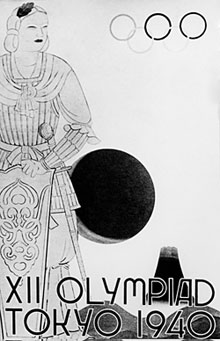
On May 24, 2012, Tokyo was selected as an official candidate to host the 32nd Olympics together with Istanbul (Turkey) and Madrid (Spain). Japan has campaigned to host the Olympics on numerous occasions and has succeeded in hosting three Olympic games. Here, we take a look at the history of Japan's bids for the Olympics.
First, let's look back over the events that take place in the run-up to deciding an Olympic host city.
All matters relating to the Olympics are stipulated in the Olympic Charter. Of course, matters concerning the Olympic host city are also contained in the Olympic Charter. Let's take a look at the section titled "Election of the host city" in the 2004 edition.
According to the current rules, any city wishing to host the Olympic Games must first secure the approval of the National Olympic Committee (NOC) of its country before submitting an official application to the International Olympic Committee (IOC). Only one city may apply from each country. If multiple candidate cities exist within the same country, the NOC concerned shall select one. After that, the IOC conducts inspections and evaluations and the host city is decided in a vote of IOC members at an IOC Session usually held seven years before the Olympic Games in question.
At this IOC Session, each candidate city makes a presentation to state the suitability of its bid before a ballot is held. The contents of these presentations are precisely stipulated to ensure that the selection and voting process is fair.
If three or more cities remain as candidates in the final ballot, the last-placed city in each round of voting is eliminated until one of the cities obtains a majority of the votes.

1940 Tokyo Olympics Poster (Photograph provided by Photo Kishimoto)
The first Olympics that Japan succeeded in winning the right to host were the 12th Olympic Games of 1940. This was a special year for Japan as it marked the 2,600th anniversary of the accession of Emperor Jimmu, and the Olympics were planned as part of the celebrations for this. At the 35th IOC Session held in Berlin in August 1936, Tokyo was involved in a straight contest with Helsinki and won the final vote by 36 votes to 27. In those days, it was possible to stage the Summer Olympics and Winter Olympics in the same country in the same year, so Japan also applied to hold the 5th Winter Olympic Games in Sapporo. This bid was conditionally approved at the 36th IOC Session in Warsaw in June 1937 and received final approval at the 37th IOC Session in Cairo in March 1938.
However, as the Second Sino-Japanese War, which broke out in July 1937, spread and became a drawn-out campaign, there was an international outcry against staging the Olympics in a nation at war. Numerous dissenting voices also appeared in Japan. In July 1938, the Tokyo Olympic Organizing Committee was finally forced to make the anguished decision to forego both the Tokyo and Sapporo Olympics.